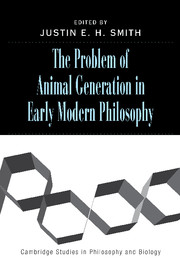Book contents
- Frontmatter
- Contents
- List of Contributors
- Introduction
- I THE DAWNING OF A NEW ERA
- II THE CARTESIAN PROGRAM
- III THE GASSENDIAN ALTERNATIVE
- IV SECOND-WAVE MECHANISM AND THE RETURN OF ANIMAL SOULS, 1650–1700
- V BETWEEN EPIGENESIS AND PREEXISTENCE: THE DEBATE INTENSIFIES, 1700–1770
- 11 Explanation and Demonstration in the Haller-Wolff Debate
- 12 Soul Power: Georg Ernst Stahl and the Debate on Generation
- 13 Charles Bonnet's Neo-Leibnizian Theory of Organic Bodies
- VI KANT AND HIS CONTEMPORARIES ON DEVELOPMENT AND THE PROBLEM OF ORGANIZED MATTER
- VII KANT AND THE BEGINNINGS OF EVOLUTION
- Bibliography
- Index
11 - Explanation and Demonstration in the Haller-Wolff Debate
Published online by Cambridge University Press: 06 August 2009
- Frontmatter
- Contents
- List of Contributors
- Introduction
- I THE DAWNING OF A NEW ERA
- II THE CARTESIAN PROGRAM
- III THE GASSENDIAN ALTERNATIVE
- IV SECOND-WAVE MECHANISM AND THE RETURN OF ANIMAL SOULS, 1650–1700
- V BETWEEN EPIGENESIS AND PREEXISTENCE: THE DEBATE INTENSIFIES, 1700–1770
- 11 Explanation and Demonstration in the Haller-Wolff Debate
- 12 Soul Power: Georg Ernst Stahl and the Debate on Generation
- 13 Charles Bonnet's Neo-Leibnizian Theory of Organic Bodies
- VI KANT AND HIS CONTEMPORARIES ON DEVELOPMENT AND THE PROBLEM OF ORGANIZED MATTER
- VII KANT AND THE BEGINNINGS OF EVOLUTION
- Bibliography
- Index
Summary
THE HALLER-WOLFF DEBATE: PREEXISTENCE VERSUS EPIGENESIS?
One issue that surfaces with regularity in studies on the problem of organic generation in the early modern period is the battle waged between preexistence theorists and advocates of epigenesis. Roughly, by preexistence, I mean the theory that, at the Creation, God preformed (to some degree at least) every living organism that would ever exist. One especially distinct form of preexistence is the emboîtement theory, according to which each organic individual is encased within the reproductive organs of one of its parents (either the mother on the ovist theory or the father on the spermist or animalculist theory), its parent is encased within the reproductive organs of one of its parents, and so forth. This accounts for all organic individuals of every generation – all future members of a given species are found encased within the first member of that species upon creation. And roughly, by epigenesis, I mean the theory that posits a truly new development of organic form. Upon coitus, matter that seemed previously to be homogenous, undifferentiated, noncomplex, unorganized, and nonunified becomes heterogeneous, differentiated, complex, organized, and unified into a living, functional individual. The form not only develops anew but is actually brought into existence as this process continues, and the process is often considered one of self-development, even self-creation. Malebranche is frequently credited with the revival of preexistence in the seventeenth century, while William Harvey coined the term “epigenesis” and developed that theory in the seventeenth century.
- Type
- Chapter
- Information
- The Problem of Animal Generation in Early Modern Philosophy , pp. 235 - 261Publisher: Cambridge University PressPrint publication year: 2006
- 10
- Cited by



